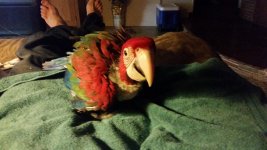shawn72chevelle
New member
- Jun 29, 2015
- 2
- 0
Hello everyone,
I apologize in advance if this has been covered. I just found this site and register for some help and insight. Ok, so I have had my greenwing for about 4 days now. I still keep in touch with the breeder on a regular basis. He was doing the hand feeding until I was ready and we were both confident I could handle the care for it. Feedings are going great, and the bird is healthy but... after 4 days it is now showing huge signs of agression. I contacted the breeder and he stated it was just being a baby. I can tell the bird is frightened by all the signs ... and need help on ways to gain it's trust. I'm not just talking about a shy bird or scared. This bird is in fight or flight stance with me... it will let me feed it and pet the head sometimes.... yesterday he was even cuddled up to me on the recliner watching a movie while I was petting him and trying to get him hear my voice in a soft peaceful way... but all of a sudden today was horrible ... started to get nippy with me so I left him alone and came back and was settled down. Today I was sitting in the chair with him and he slowly crawled up my chest which I'm glad he's walking for exercise and using his mouth to grab my shirt and pull him self up and them lunges at my face in a full attack mode.... i didn't react to it I knew it was about to happen so I simply put him back in the container and left him alone for a bit more... i was able to come and pet his head later to ensure him I mean no harm and he's ok. But .......... all of a sudden tonight he's hissing and also kinda making a barking sound at me and eyes are pinned like crazy with its wing slightly back and trying to leap at me and bite ... it reminds me of a rabid dog.... and I'm just confused if this is normal or not and steps I can take to help tame it and allow it trust me...
I apologize in advance if this has been covered. I just found this site and register for some help and insight. Ok, so I have had my greenwing for about 4 days now. I still keep in touch with the breeder on a regular basis. He was doing the hand feeding until I was ready and we were both confident I could handle the care for it. Feedings are going great, and the bird is healthy but... after 4 days it is now showing huge signs of agression. I contacted the breeder and he stated it was just being a baby. I can tell the bird is frightened by all the signs ... and need help on ways to gain it's trust. I'm not just talking about a shy bird or scared. This bird is in fight or flight stance with me... it will let me feed it and pet the head sometimes.... yesterday he was even cuddled up to me on the recliner watching a movie while I was petting him and trying to get him hear my voice in a soft peaceful way... but all of a sudden today was horrible ... started to get nippy with me so I left him alone and came back and was settled down. Today I was sitting in the chair with him and he slowly crawled up my chest which I'm glad he's walking for exercise and using his mouth to grab my shirt and pull him self up and them lunges at my face in a full attack mode.... i didn't react to it I knew it was about to happen so I simply put him back in the container and left him alone for a bit more... i was able to come and pet his head later to ensure him I mean no harm and he's ok. But .......... all of a sudden tonight he's hissing and also kinda making a barking sound at me and eyes are pinned like crazy with its wing slightly back and trying to leap at me and bite ... it reminds me of a rabid dog.... and I'm just confused if this is normal or not and steps I can take to help tame it and allow it trust me...
Attachments
Last edited:
